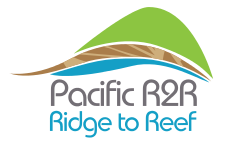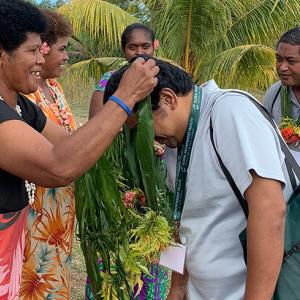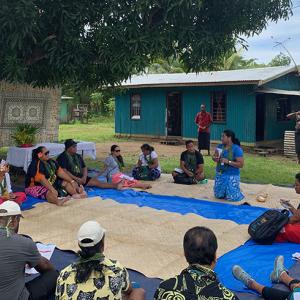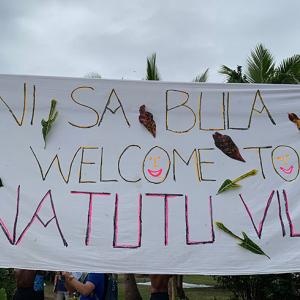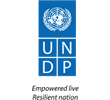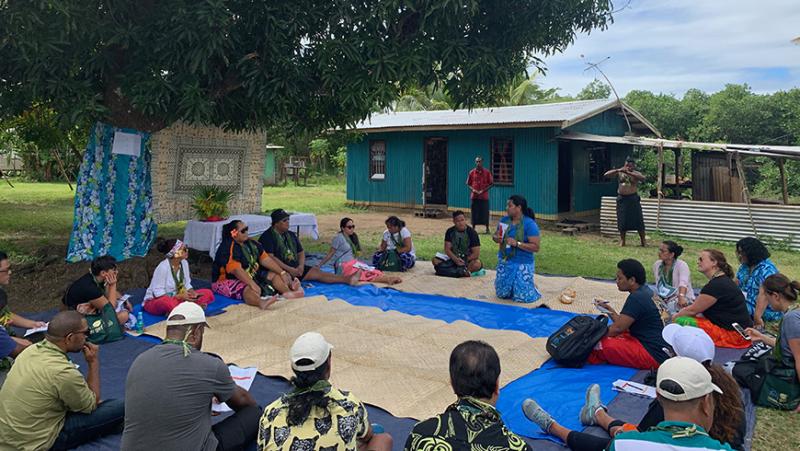
The GEF Like many other Pacific Island countries, Fiji is one of the most coveted tourist destinations in the world. At the same time, it is a microcosm of some significant development and environmental challenges. A natural resource-dependent country with limited land area, Fiji experiences intense competing pressures for agriculture, tourism, transport, water, and other needs.
Last week, Fiji hosted the GEF’s Pacific Expanded Constituency Workshop (ECW) – an opportunity for Pacific Island countries to come together to meet with regional counterparts, review GEF strategies, and discuss policies, procedures, and experiences from GEF projects. More than 150 people from 17 countries participated in the gathering, including representatives of governments, international institutions, and civil society organizations. The ECW also included a visit to the GEF-funded Ridge to Reef (R2R) project site where participants had an opportunity to engage with communities who have benefited from the program implemented in partnership with the UN Development Program.
The Ridge to Reef project, launched in 2016, aims to preserve biodiversity, provide ecosystem services, sequester carbon, improve climate resilience, and sustain livelihoods through a ridge-to-reef management of priority water catchments on the two main islands of Fiji. One of its main goals is to ensure an integrated approach to land, water, forest, biodiversity, and coastal resource management in a way that helps reduce poverty and support sustainable livelihoods in local communities.
The ECW field visit was designed as a mutual learning experience for participants to visit the Fijian villages where the project is being implemented – Votua and Natutu – in Ba Province, one of the country’s priority watersheds. The visit offered an opportunity to learn from community members engaged with the project. Of the countries participating in the interactive learning event in Fiji, fourteen were Pacific Islands that are also implementing similar ridge-to-reef projects of their own.
In both the Votua and Natutu villages, three learning stations were set up for participants to discuss their recent challenges and successes regarding 1) policy implication, 2) stakeholder engagement, and 3) livelihood restoration. After being welcomed by local women with hand-made floral necklaces and joining a traditional ceremony, participants were divided into small groups and then walked around the villages, moving from one station to the next.
They learned that, with thorough community engagement, the Ridge to Reef project is helping achieve landscape-level watershed management and the restoration of livelihoods in the villages. During the activity, local project staff, local government officials, and villagers also talked openly about the challenges that they face, such as poaching, black sand mining, sedimentation from upstream, and flooding. In response, the ECW participants from across the Pacific region offered ideas from their own countries, such as participatory fishery management, community engagement, local governance systems to support consensus-building, and the utilization of Environmental Impact Assessments in consultations with developers.
Finally, in the villages, women’s groups prepared a delicious lunch of local fish, shrimp, crab, clams, chicken, taro, casaba, coconuts and more. Because ocean plastic was one of the key topics of discussion at the Pacific ECW, no plastic plates, cups, or utensils were used. And to avoid plastic water bottles, the villagers offered coconut water to their guests. After a traditional ceremony featuring local music and dancing, the participants left the villages with both good memories and helpful lessons from local communities about how Ridge to Reef projects can work well both in Fiji and elsewhere.
Original Publications - https://www.thegef.org/blog/ridge-reef-learning-holistic-best-practice-fiji
All photos courtesy of Malvika Monga/GEF.
